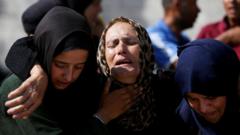As the conflict in Gaza continues, Hamas has indicated it is consulting with other Palestinian groups regarding a proposed ceasefire and hostage release plan endorsed by the U.S. This comes as Israeli military operations escalate across the region, raising concerns about humanitarian conditions and the potential for a negotiated resolution.
Hamas Engages in Consultations Over Proposed Gaza Ceasefire and Hostage Release Plan

Hamas Engages in Consultations Over Proposed Gaza Ceasefire and Hostage Release Plan
Hamas is currently discussing a ceasefire proposal with other Palestinian factions amid ongoing violence in Gaza.
Hamas announced early Friday that it is engaged in discussions with other Palestinian faction leaders concerning the ceasefire proposal put forth by regional mediators Qatar and Egypt. The plan is said to include a phased release of 10 living Israeli hostages and the remains of 18 others in exchange for Palestinian prisoners held in Israeli detention. The U.S. President had expressed optimism about reaching an agreement with Hamas within 24 hours, with Israel expected to facilitate the conditions necessary for a temporary 60-day ceasefire to allow for negotiations.
Despite this, violence in Gaza has intensified, with reports of airstrikes continuing in areas such as Khan Younis. Local health authorities indicated that airstrikes have resulted in significant casualties, with at least 15 Palestinians killed in recent operations. The Israeli military has stated that its operations are focused on dismantling Hamas's military capabilities, further complicating the prospects for an immediate ceasefire.
Hamas has articulated key demands as part of the ceasefire negotiations, including the resumption of unrestricted aid into Gaza and assurances against renewed Israeli military actions following the proposed ceasefire period. The proposal also seeks a commitment from the international community, including the United Nations and the Red Cross, to ensure the delivery of essential supplies to the population in Gaza.
As discussions unfold, Israeli Prime Minister Benjamin Netanyahu has underscored his commitment to securing the return of all hostages taken during the conflict while refraining from committing to an end to hostilities until this objective is achieved. The ongoing engagement between Hamas, regional mediators, and Israel holds significant implications for the humanitarian crisis in Gaza and overall regional stability in the face of continued violence and loss of life.
Despite this, violence in Gaza has intensified, with reports of airstrikes continuing in areas such as Khan Younis. Local health authorities indicated that airstrikes have resulted in significant casualties, with at least 15 Palestinians killed in recent operations. The Israeli military has stated that its operations are focused on dismantling Hamas's military capabilities, further complicating the prospects for an immediate ceasefire.
Hamas has articulated key demands as part of the ceasefire negotiations, including the resumption of unrestricted aid into Gaza and assurances against renewed Israeli military actions following the proposed ceasefire period. The proposal also seeks a commitment from the international community, including the United Nations and the Red Cross, to ensure the delivery of essential supplies to the population in Gaza.
As discussions unfold, Israeli Prime Minister Benjamin Netanyahu has underscored his commitment to securing the return of all hostages taken during the conflict while refraining from committing to an end to hostilities until this objective is achieved. The ongoing engagement between Hamas, regional mediators, and Israel holds significant implications for the humanitarian crisis in Gaza and overall regional stability in the face of continued violence and loss of life.



















